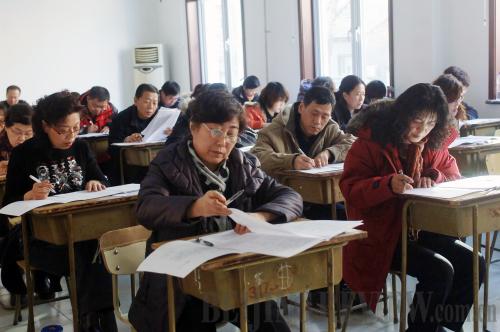|
 |
|
CERTIFIED STAFF: Beijing holds its first certification exam for social workers working as trade union staff members on November 25, 2010 (ZHAO WANWEI) |
The Beijing Federation of Trade Unions announced on December 28, 2010, its efforts to establish collective salary negotiation systems would focus on enterprises that give some employees a minimum wage, enterprises with frequent labor-management conflicts, labor-intensive enterprises, private enterprises and foreign companies.
Although China's Labor Law, which stipulates collective contracts shall be signed by and between the trade union on behalf of the employees and the employer, has been in effect for 16 years, the trade unions in China have not acted strong enough to fight for member interests during the negotiations with employers.
Talking about the difficulties met by the trade unions in promoting collective salary negotiation system, Xu Xiaojun, a professor at the China Institute of Industrial Relations, told Beijing-based Insight China magazine trade union leaders were not used to participating in the decision of salary levels and didn't have experience in such negotiations.
Xu said the leaders also lacked the courage to stand up against management to protect employee interests.
According to a report of Insight China, the fate of trade union leaders has been subject to company management, which can easily fire employees using the excuse dereliction of duty. The report said most trade union chairs were not elected by employees and were instead selected and recommended by company mangers.
Tang Xiaodong, a former employee of a Japan-China joint venture in Beijing, was the first trade union chief in the country who was fired during his tenure. In August 2003, Tang was elected to be his company's trade union chairman at the self-organized employees' assembly. The Federation of Trade Unions of Haidian District ratified the election results in the same month. On September 9, on behalf of the trade union, Tang required management to sign labor contracts with workers without a contract. Less than two months later, the company fired Tang, accusing him of revealing false information about the company to the media.
Over the next few years, trade union leaders with similar experiences as Tang were reported in other Chinese cities.
"I think trade union chairs should become independent from companies, which will give them more freedom to fight for employees' interests," Zhang Yujing, an official with the Beijing Federation of Trade Unions, told Insight China.
In 2010, the ACFTU injected a total of 10 million yuan ($1.5 million) to federations of trade unions in 10 provinces to finance pilot projects for company trade unions to hire salaried staff members.
By the end of September 2010, 5,121 people had been hired in areas with pilot projects.
Incomplete rules
The Salary Regulations, long regarded as a landmark code for China's income distribution reform, failed to come out in 2010 as many people expected. China Newsweek magazine quoted people participating in the drafting of this code as saying a core issue they had debated was whether a collective salary negotiation system should be the basic way to decide salaries.
An anonymous drafter told China Newsweek if the draft stipulated the company should agree to conduct negotiations on salary levels whenever the employees have such a requirement, it would be infeasible.
Professor Lin Yanling at the China Institute of Industrial Relations told China Newsweek that a more realistic approach is to "establish an institution enabling labor to negotiate with the management collectively and let the labor market decide the final salary level." | 